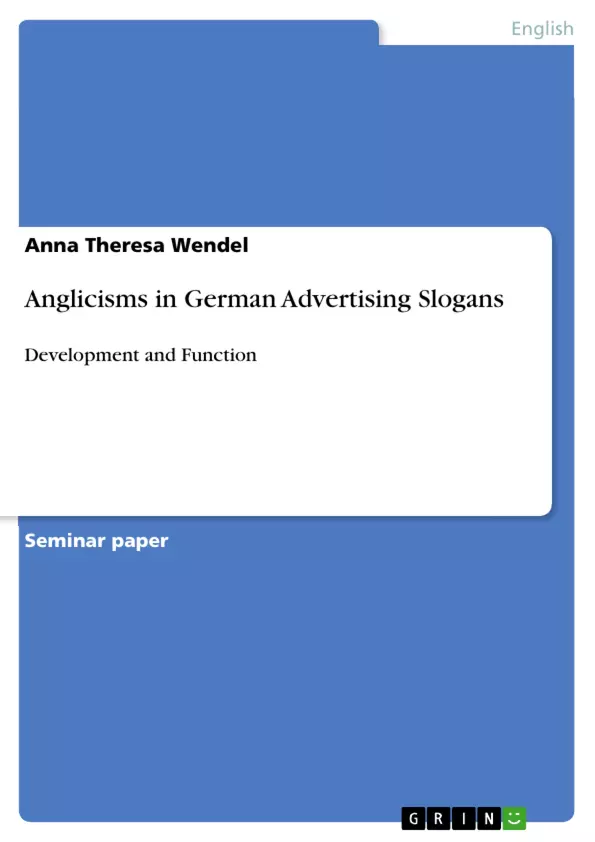For quite some time, advertising is a gateway for anglicisms into the German language. The VDS (Verein Deutscher Sprache/ Association of German Language) also shares this opinion. They say that the main transmitters for anglicisms in Germany are the mass media and the advertising and entertaining industry.
Although anglicisms belong to the most explored aspects of advertising language, there haven’t been many empirical studies yet. Their proportion in a temporal comparative and in connection with various product groups is rarely studied in the German-speaking area. Especially the researches of Dagmar Schütte and the database slogans.de offer a basis to investigate these questions.
In this paper, it will be mainly referred to slogans since they appear in every kind of media and because they are the main representatives of the trends in the advertising language. First the evaluation of Schütte (1996), which reaches until 1991, should be checked. Then it should be examined whether the increase of English slogans continues onwards in the 1990s and the 2000s. Furthermore the sectoral distribution of English slogans will be analyzed. In order to provide a prospect to the future, this work will also contain a chapter about the new language trend in German advertising. Schütte defines an anglicism as a linguistic sign, consisting wholly or partly of English morphemes, regardless of whether it is connected to a common meaning in the English language usage or not. In the following, this definition is adopted, what means that the term anglicism is generally an English coined word or expression.
Inhaltsverzeichnis (Table of Contents)
- Introduction
- The Usage of English in German Advertising Slogans
- Development of English Slogans in German Advertising
- Function of English Slogans
- A new trend in German Advertising
Zielsetzung und Themenschwerpunkte (Objectives and Key Themes)
The main objective of this paper is to investigate the rising usage of English slogans in German advertising and to analyze the underlying reasons for this trend. This study aims to shed light on the historical development of English slogans in Germany, with a focus on the periods from the 1950s to the 2000s. Additionally, it aims to examine the sectoral distribution of English slogans and to explore the influence of globalization and the media landscape on their adoption.
- The rise of English in German advertising slogans since the 1950s
- The role of globalization and the media landscape in the adoption of English slogans
- The sectoral distribution of English slogans across different industries
- The function and impact of English slogans in German advertising
- Emerging trends in the use of English in German advertising
Zusammenfassung der Kapitel (Chapter Summaries)
The introduction provides an overview of the topic and highlights the significance of studying the use of English in German advertising slogans. It also sets the context for the analysis, noting the lack of extensive empirical studies in this area.
Chapter 2 focuses on the usage of English in German advertising slogans, examining the historical development, function, and impact of English slogans. This chapter delves into the significant increase of English slogans observed in recent years, highlighting the role of globalization and the evolving media landscape in this phenomenon.
Chapter 2.1 delves into the development of English slogans in German advertising, analyzing the trends observed in the decades from the 1950s to the 2000s. It explores the factors contributing to the rise of English slogans, including the influence of American companies and the growing importance of media sectors like television and online advertising. The chapter utilizes data from various sources, including Schütte's content-analysis study and the slogans.de database, to illustrate the significant increase in the proportion of English slogans in recent decades.
Chapter 2.2 explores the function of English slogans in German advertising, emphasizing their role in brand recognition, image building, and conveying product benefits. This chapter examines how slogans serve as powerful tools for establishing brand identity and memorability, further contributing to their widespread adoption in advertising.
Schlüsselwörter (Keywords)
The core keywords and concepts explored in this paper include English slogans, German advertising, globalization, media landscape, sectoral distribution, anglicisms, brand recognition, image building, and advertising language.
Frequently Asked Questions
What is considered an "anglicism" in German advertising?
An anglicism is defined as a linguistic sign consisting wholly or partly of English morphemes, regardless of whether it matches standard English usage.
How has the use of English slogans changed over time?
There has been a significant increase in English slogans from the 1950s through the 2000s, driven by globalization and the influence of American companies.
Why do German advertisers use English slogans?
English slogans are used for brand recognition, image building, and to convey modern product benefits to a globalized audience.
Which media are the main transmitters of anglicisms?
Mass media, the advertising industry, and the entertainment industry (including television and online advertising) are the primary transmitters.
Are there sectoral differences in the use of English slogans?
Yes, the paper analyzes the sectoral distribution, showing that certain industries adopt English slogans more frequently than others based on their target audience.
- Citation du texte
- Anna Theresa Wendel (Auteur), 2013, Anglicisms in German Advertising Slogans, Munich, GRIN Verlag, https://www.grin.com/document/279557



